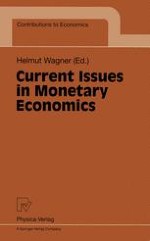1998 | OriginalPaper | Buchkapitel
Monetary Policy Strategies: From Rules to Central Bank Contracts under Contingent Target Agreements
verfasst von : Alexander Karmann
Erschienen in: Current Issues in Monetary Economics
Verlag: Physica-Verlag HD
Enthalten in: Professional Book Archive
Aktivieren Sie unsere intelligente Suche, um passende Fachinhalte oder Patente zu finden.
Wählen Sie Textabschnitte aus um mit Künstlicher Intelligenz passenden Patente zu finden. powered by
Markieren Sie Textabschnitte, um KI-gestützt weitere passende Inhalte zu finden. powered by
The rules-versus-discretion debate in monetary policy is at least 150 years old, as Stanley Fischer (1990) points out. For a long time, until 1977, the advocates of discretionary policy strategies could refer to the fact that, methodologically, any rule could be adopted by some discretionary policy. Due to the problem of time inconsistency, as in the Barro-Gordon model of 1983, a simple rule seems to be superior to discretionary policy, at least in deterministic models. But simple rules do not solve the trade-off between optimal, i.e. flexible, and credible policies in models with stochastic supply disturbances. The rules debate still touches on the recent discussion of credible institutional arrangements for monetary policy like central bank contracting in the presence of informational asymmetries (Walsh (1995a)). The question to be answered in designing optimal institutional mechanisms is to what extent discretionary power should be given to the central bank to engage in stabilization, based on its private information. McCallum (1995) already pointed out that even central bank contracting may not solve the credibility problem since there is no ex-post incentive for the government to realize the sanctions included into the contract when not achieving the contracted targets. This view seems to be supported by recent historical experience with the New Zealand 1989 Act.
